USDA: Corn planting down, but still fifth largest acreage

March 31, 2014
BY Erin Krueger
The USDA’s National Agriculture Statistics Service has released its Prospective Plantings report, predicting 91.7 million acres of corn will be planted this year, down 4 percent from last year. If realized, the report notes that area will represent the lowest planted acreage in the U.S. since 2010. It would, however, still be the fifth largest corn acreage since 1944.
On a state-by-state basis, corn acreage is expected to drop in 32 states. Increases, however, are expected in Colorado, Idaho, Iowa, Kansas, Maine, Massachusetts, and Utah. Corn acreage is expected to remain unchanged in Connecticut, Michigan, Minnesota, Montana, New Jersey, Oregon, Rhode Island, Washington, and Wisconsin. Iowa is expected to remain the state with the largest corn acreage, with 14 million acres planted this year, up from 13.6 million last year. If realized, the report notes that the 380,000 acres of corn expected to be planted in Idaho would be a record high.
While farmers are expected to plant less corn this year, the USDA predicts planted acreage for soybeans will increase by 6 percent, reaching 81.5 million acres. Wheat acreage is expected to be at 55.8 million acres, down 1 percent. Only 6.68 million acres of sorghum is forecast to be planted this year, down 17 percent from 8.06 million acres in 2013. Sugar beet acreage is also expected to drop slightly, from 1.2 million acres last year to 1.15 million acres this year, resulting in a 4 percent reduction.
Advertisement
Advertisement
A full copy of the report can be downloaded from the NASS website.
Advertisement
Advertisement
Related Stories
The USDA significantly increased its estimate for 2025-’26 soybean oil use in biofuel production in its latest World Agricultural Supply and Demand Estimates report, released July 11. The outlook for soybean production was revised down.
U.S. fuel ethanol capacity fell slightly in April, while biodiesel and renewable diesel capacity held steady, according to data released by the U.S. EIA on June 30. Feedstock consumption was down when compared to the previous month.
The U.S. EPA on July 8 hosted virtual public hearing to gather input on the agency’s recently released proposed rule to set 2026 and 2027 RFS RVOs. Members of the biofuel industry were among those to offer testimony during the event.
The USDA’s Risk Management Agency is implementing multiple changes to the Camelina pilot insurance program for the 2026 and succeeding crop years. The changes will expand coverage options and provide greater flexibility for producers.
The USDA’s National Agricultural Statistics Service on June 30 released its annual Acreage report, estimating that 83.4 million acres of soybeans have been planted in the U.S. this year, down 4% when compared to 2024.
Upcoming Events










